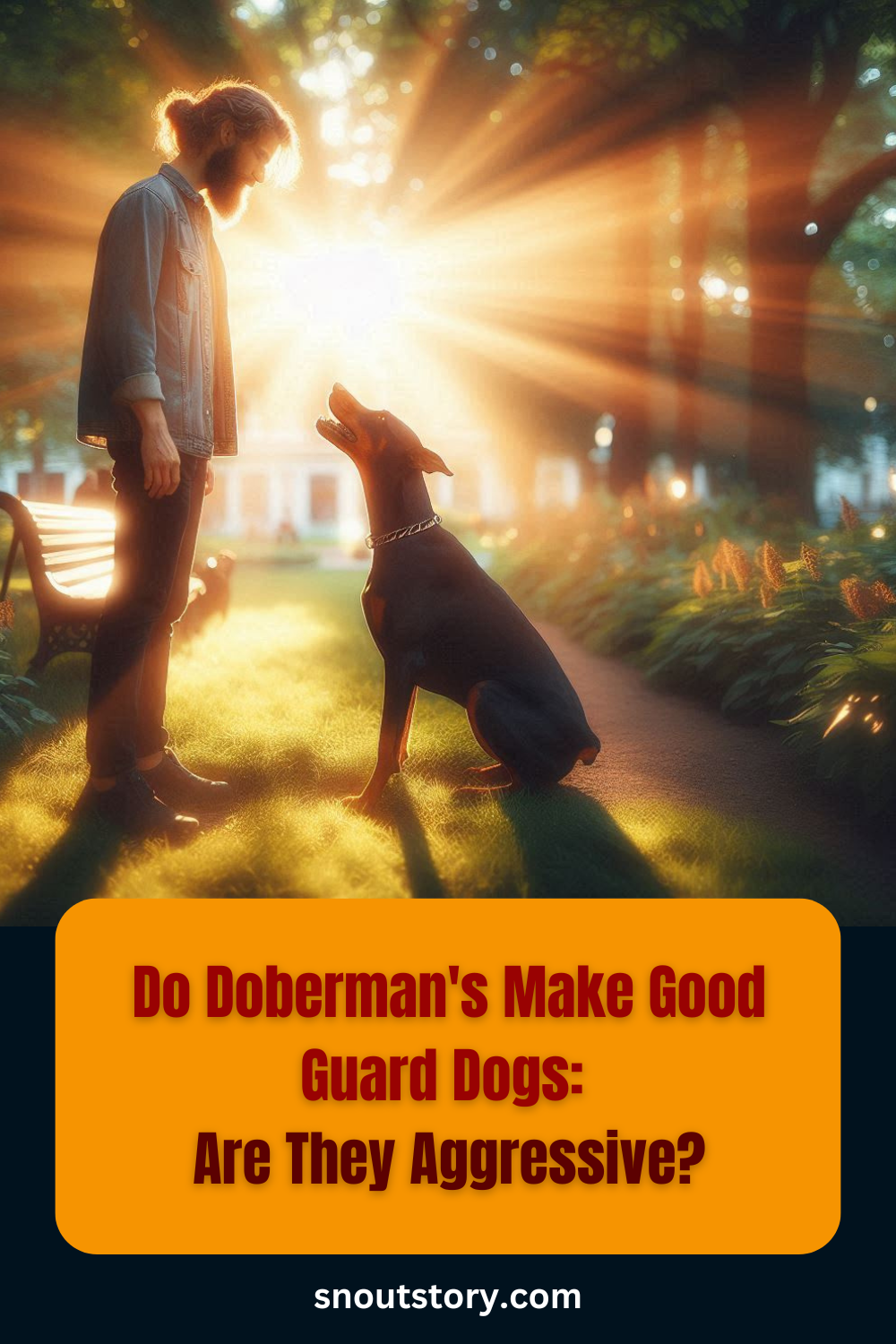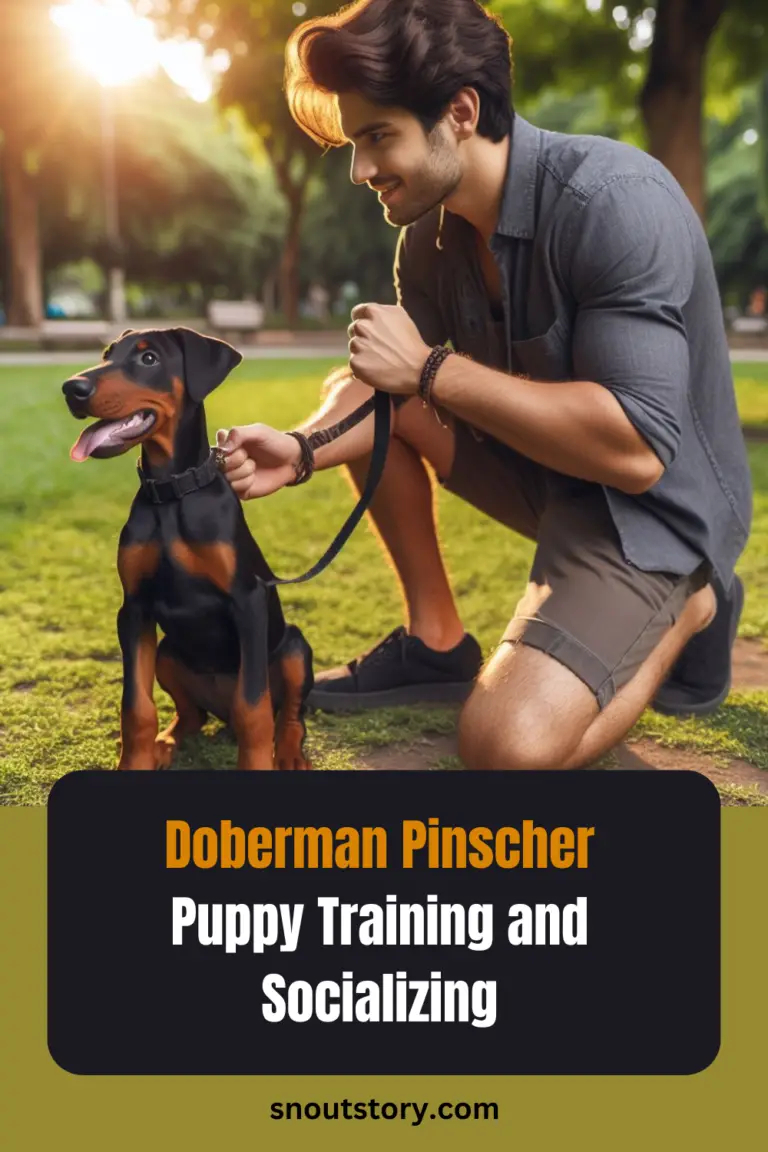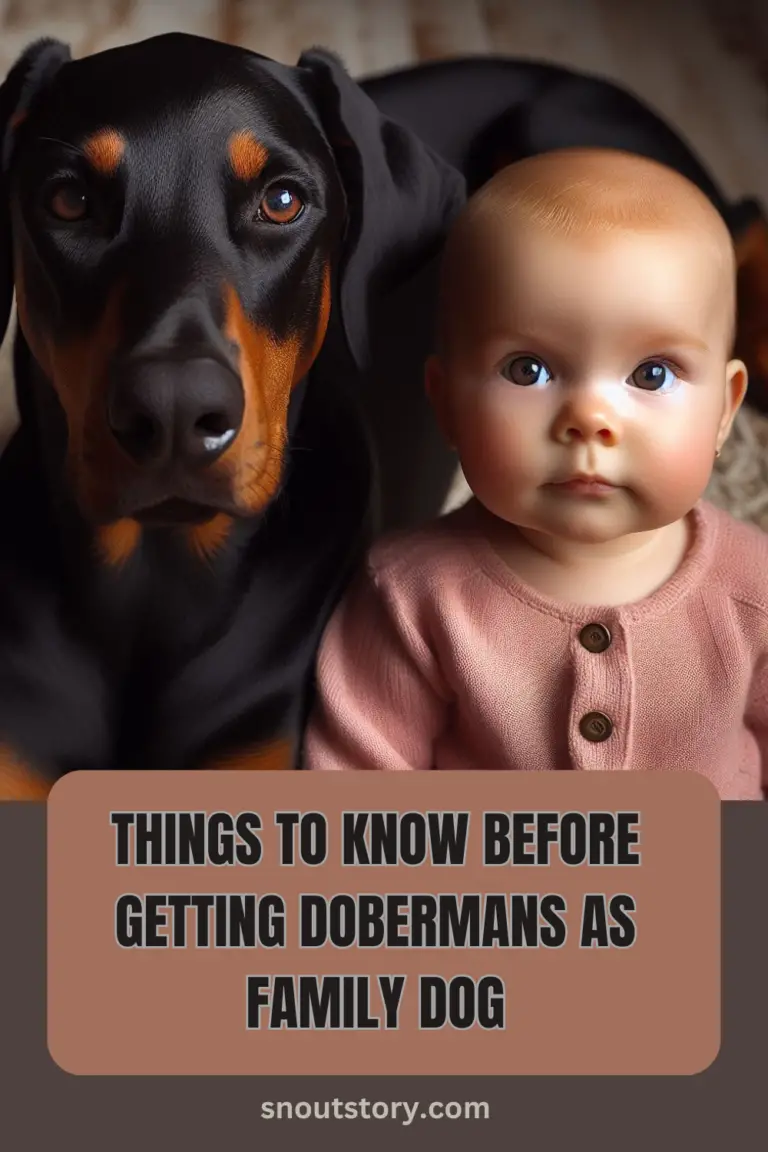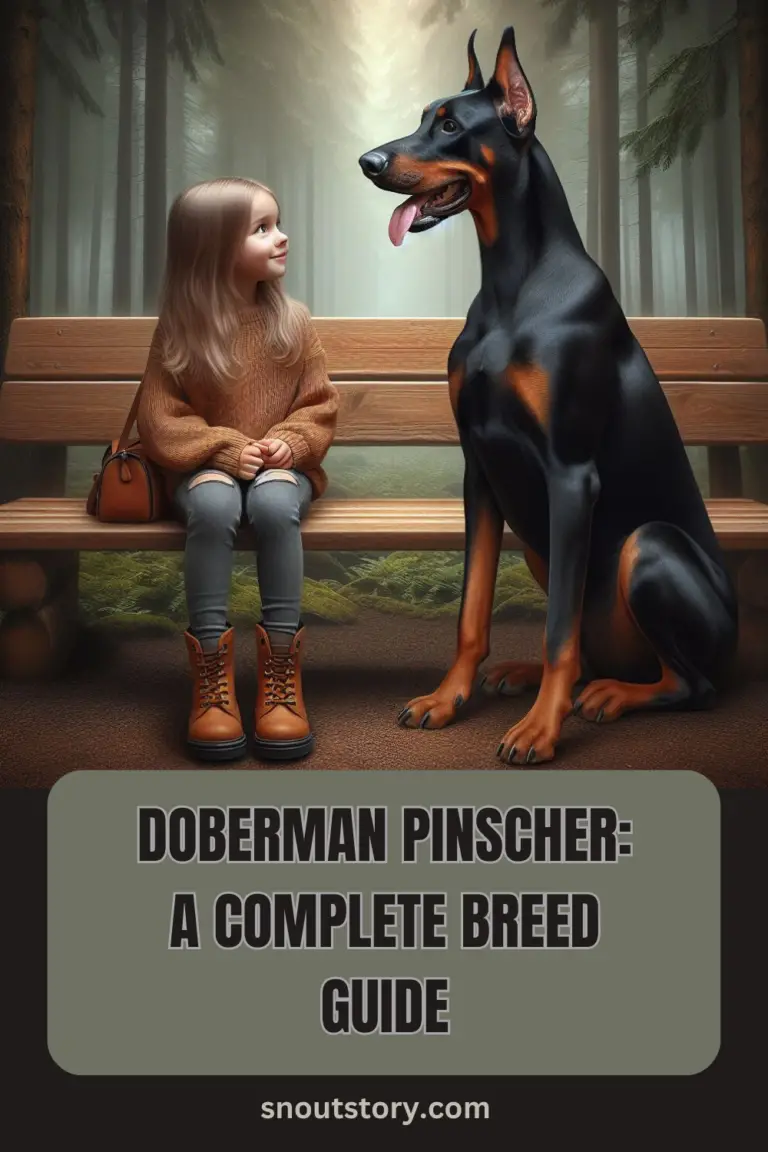Disclaimer
“This Blog is completely reader supported, for any purchase you make from affiliate links on this blog we earn a small commissions with no extra cost to you, which I use to feed my poor puppies 🥺”
Choosing a Doberman as a guard dog is a significant decision that requires understanding their unique characteristics and needs. Dobermans are known for their loyalty, intelligence, and strong protective instincts, making them excellent guard dogs when properly trained and socialized.
However, potential owners often wonder about their aggression levels and how to manage them. This guide will explore crucial aspects such as the temperament of Dobermans, their training requirements, and socialization.
By addressing these questions, you can ensure that you are well-prepared to integrate a Doberman into your home as a reliable and loving guardian.
Are Dobermans Naturally Aggressive or Protective?

Are Dobermans naturally aggressive or protective? You’ll find that Dobermans are more protective than aggressive. This breed was originally developed for protection and companionship, so they naturally have a strong instinct to guard their family and territory.
Causes of perceived aggression in Dobermans can include inadequate training, lack of socialization, or fear. Signs of a protective Doberman include alertness, vigilance, and a readiness to act when they sense a threat, often without unnecessary aggression.
To ensure your Doberman is more protective than aggressive, treatment involves proper socialization from a young age, consistent training, and positive reinforcement to build confidence and obedience. Remember, a well-trained and socialized Doberman will be a loyal protector, not an aggressive menace.
What Training Is Necessary for a Doberman to Be an Effective Guard Dog?
First, you’ll need to focus on basic obedience training to ensure your Doberman understands and responds to commands like sit, stay, and come. Causes of ineffective guarding can stem from a lack of foundational training or inconsistent discipline.
Signs that your Doberman is becoming an effective guard dog include attentiveness to surroundings and a calm yet assertive demeanor when encountering potential threats. Process for improving guard capabilities involves advanced training techniques, such as teaching your Doberman to recognize and react to different scenarios, and incorporating socialization to differentiate between normal and threatening situations.
Consistent training sessions, positive reinforcement, and professional guidance if needed will help mold your Doberman into a reliable and effective guard dog. One thing that will surely help you boost your training process is a mild shock collar which is not too harsh on your puppy, here’s one of the collars that we personally use to train our dogs.
PetSpy P620 Dog Training Shock Collar

Also Read: 6 Best Dog Training Collars (Review and Buyers Guide)
How Do Dobermans Compare to Other Guard Dog Breeds?
Dobermans stand out due to their blend of intelligence, loyalty, and physical prowess. Causes for preferring Dobermans include their natural protective instincts and their ability to be trained effectively.
Signs of a well-trained Doberman include their alertness, responsiveness, and calm demeanor in potentially threatening situations. Compared to breeds like German Shepherds, which are also intelligent and trainable, Dobermans often exhibit more agility and speed, making them excellent for patrolling larger properties.
The only way for enhancing their guard dog capabilities involves regular training, socialization, and mental stimulation to keep them sharp and responsive. If you’re looking for a guard dog that is both a loving family companion and a vigilant protector, Dobermans offer a balanced solution with their unique combination of traits.
What Are the Key Temperament Traits of a Doberman?
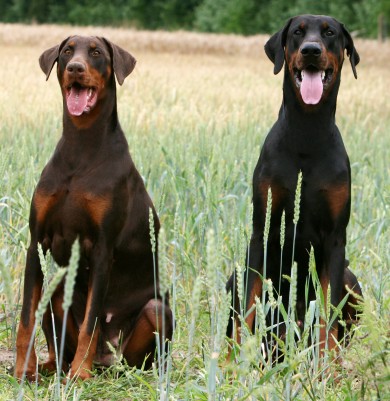
- Intelligence: You’ll notice Dobermans are highly intelligent and capable of learning commands quickly, making them easy to train for various tasks.
- Loyalty: They form strong bonds with their owners, showing unwavering loyalty and a desire to protect their family members.
- Alertness: Dobermans are naturally alert and aware of their surroundings, which is why they excel as guard dogs.
- Fearlessness: This breed exhibits a bold and fearless attitude, unafraid to confront potential threats head-on.
- Affectionate: Despite their tough exterior, Dobermans are affectionate and enjoy spending quality time with their loved ones.
- Confidence: You’ll find Dobermans carry themselves with confidence, a trait that helps them stay calm and composed in various situations.
- Protectiveness: Their natural protective instinct means they are always on the lookout for potential dangers, ready to defend their home and family.
- Social: While they can be reserved around strangers, Dobermans are generally social and enjoy interacting with people and other animals when properly socialized.
- Sensitivity: They are sensitive to their owner’s emotions and can pick up on stress or tension, often acting to provide comfort.
How Much Socialization Does a Doberman Need to Prevent Aggressive Behavior?
Ensuring a Doberman is well-socialized is crucial to preventing aggressive behavior. You need to start socializing your Doberman puppy as early as possible, ideally within the first few months of life.
Causes: A lack of socialization can lead to fear and anxiety, which are common triggers for aggression in Dobermans.
Signs: Watch for signs such as growling, barking excessively, or showing fear towards unfamiliar people and animals.
Solution: To effectively socialize your Doberman, expose them to a variety of environments, people, and other dogs in a controlled and positive manner. Regular visits to parks, obedience classes, and playdates with other well-behaved dogs can significantly help. Positive reinforcement, such as treats and praise, should be used to encourage good behavior during social interactions. Consistent socialization throughout their life will help your Doberman remain well-adjusted and less likely to exhibit aggressive behavior.
Also Read: Doberman Pinscher Puppy Training and Socializing (A Complete Guide)
How Do Dobermans Interact with Strangers and Family Members?
Understanding how Dobermans interact with strangers and family members is crucial if you’re considering one as a guard dog. Their natural protective instincts make them excellent guard dogs, but socialization is key to managing their behavior.
Dobermans are typically very loyal and affectionate with their families, often forming strong bonds with only one person in family and showing a playful side. However, their interaction with strangers can vary. Causes of cautious or aggressive behavior towards strangers often stem from lack of socialization or negative experiences. Signs that your Doberman may be uncomfortable around strangers include growling, barking, or showing defensive body language.
Only solution for these issues involves consistent socialization, positive reinforcement, and potentially working with a professional trainer to ensure your Doberman can differentiate between a friend and a threat. By understanding and addressing these aspects, you can help your Doberman be a well-rounded and reliable guard dog.
How Do Dobermans Interact with Children and Other Pets in a Household?
Dobermans can have varying interactions with children and other pets in your household. This breed is known for its loyalty and protective nature, which can be beneficial in a family setting. However, due to their high energy levels and strong-willed personalities, it’s crucial to establish boundaries early on.
Dobermans typically do well with children if they are properly socialized and trained to understand the limits of their behavior. They can be gentle and affectionate with kids but might need supervision to ensure playtime stays safe and positive. When it comes to other pets, Dobermans can coexist peacefully if introduced gradually and under controlled circumstances.
Proper socialization from a young age can help prevent any dominance or territorial issues. Consistency in training and positive reinforcement will contribute to a harmonious household where your Doberman feels secure and integrated.
How Does a Doberman’s Energy Level and Exercise Needs Impact Their Guarding Abilities?
Your Doberman’s energy level and exercise needs have a significant impact on their guarding abilities. High energy levels mean they are naturally vigilant, always ready to respond to potential threats. To maintain this readiness, regular exercise is crucial. Without sufficient physical activity, your Doberman might become restless or develop behavioral issues that could undermine their effectiveness as a guard dog.
Ensuring they get enough exercise not only keeps them fit but also channels their energy positively, helping them stay focused and disciplined. Mental stimulation is equally important; engaging your Doberman with obedience training or puzzle toys keeps their mind sharp, allowing them to distinguish between normal and suspicious activities.
Establishing a consistent exercise routine reinforces their role as a protector, making them more reliable in guarding scenarios. Proper socialization and ongoing training sessions further enhance their ability to discern threats accurately, resulting in a balanced and effective guard dog. By addressing these aspects, you ensure that your Doberman’s natural energy and exercise needs support their guarding duties, providing optimal protection for your home and family.
What Legal and Insurance Considerations Are There for Owning a Doberman as a Guard Dog?
Owning a Doberman as a guard dog involves several legal and insurance considerations that you need to be aware of. Many areas have breed-specific legislation that may restrict or regulate the ownership of Dobermans due to their reputation as a protective breed. It’s essential to check local laws and ordinances to ensure you’re in compliance.
Additionally, homeowners’ insurance policies can be impacted by the presence of a Doberman. Some insurers might increase premiums or exclude coverage for certain breeds considered high-risk. To mitigate these challenges, make sure your Doberman is well-trained and properly socialized, which can help demonstrate responsible ownership to both legal authorities and insurance providers.
Consulting with an attorney who specializes in pet laws and working with an insurance agent familiar with dog breed policies can provide you with tailored advice and solutions. This proactive approach will help you navigate the complexities of owning a Doberman as a guard dog, ensuring both legal compliance and adequate insurance coverage.
Summary
In conclusion, Dobermans can make excellent guard dogs due to their loyalty, intelligence, and natural protective instincts. However, their potential for aggression requires responsible ownership, including proper training, socialization, and understanding of their temperament.
While they can be fierce protectors, well-trained Dobermans are also affectionate family pets. By addressing their needs and following legal and insurance guidelines, you can ensure your Doberman is a reliable and balanced guardian.
This comprehensive understanding will help you decide if a Doberman is the right guard dog for your home, ensuring safety and companionship.
Recommended
8 Super-Foods to Ensure Your Doberman Lives a Long-Life
Do Dobermans Make Good Family Dogs? 8 Surprising Facts
Doberman Pinscher Puppy Training and Socializing (A Complete Guide)
Doberman Pinscher Size and Weight – Everything a New Owner Needs to Know
Doberman Pinscher Temperament and Traits – Everything New Owner Should Know
The Doberman Pinscher: Complete Breed Guide
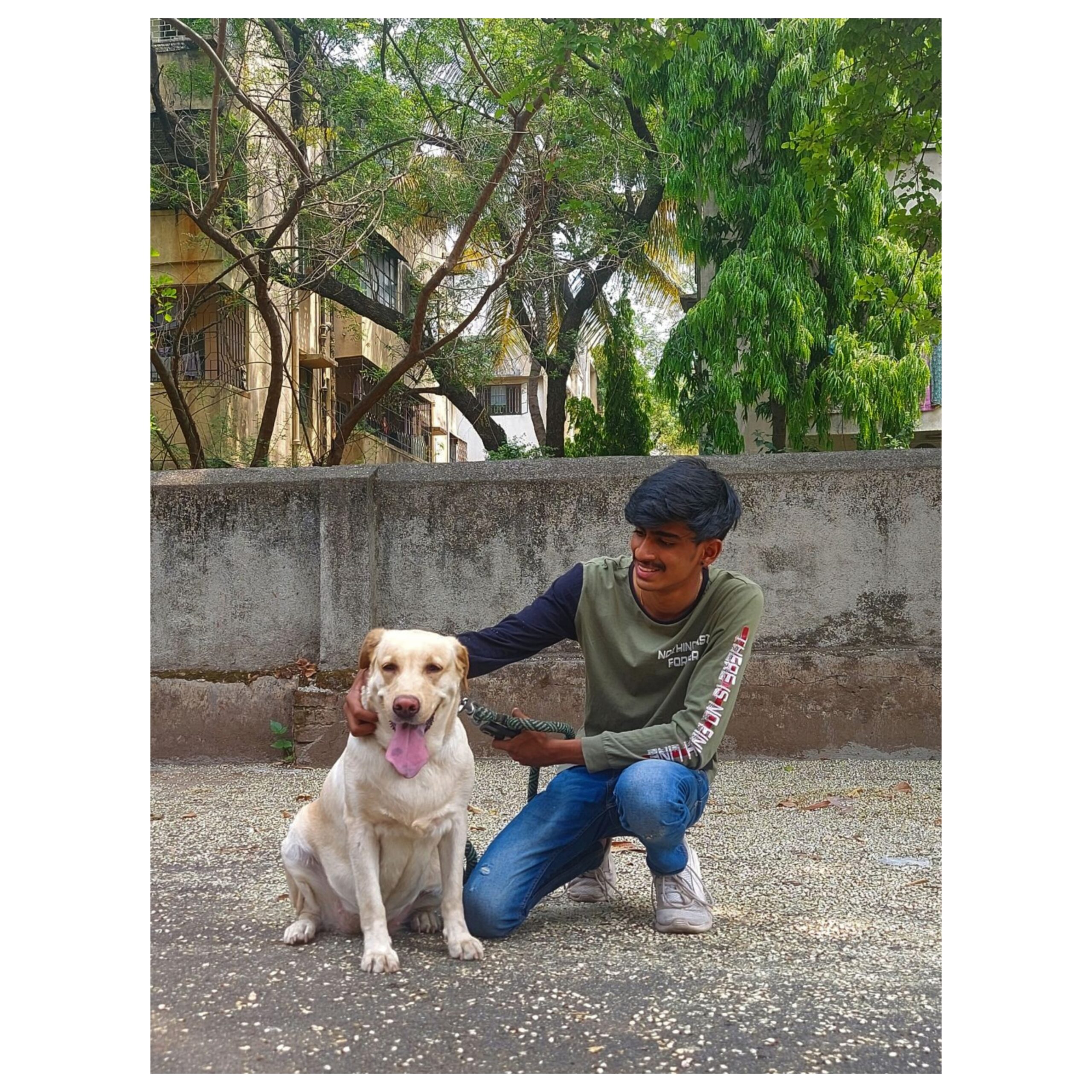
Vedant Narvekar is an experienced digital marketing expert with a profound love for nature and animals. With a career rooted in leveraging online platforms to drive engagement and promote meaningful causes, Vedant’s passion for animals inspired him to start Snout Story—a blog dedicated to educating people about pet keeping and sharing proper knowledge about caring for animals. Drawing on his expertise in digital marketing, Vedant utilizes his platform to advocate for responsible pet ownership, providing valuable insights on pet care, training, nutrition, and more. Through Snout Story, Vedant aims to empower pet lovers with the information they need to provide the best possible care for their furry companions, while also fostering a deeper appreciation for the natural world and the creatures that inhabit it.

